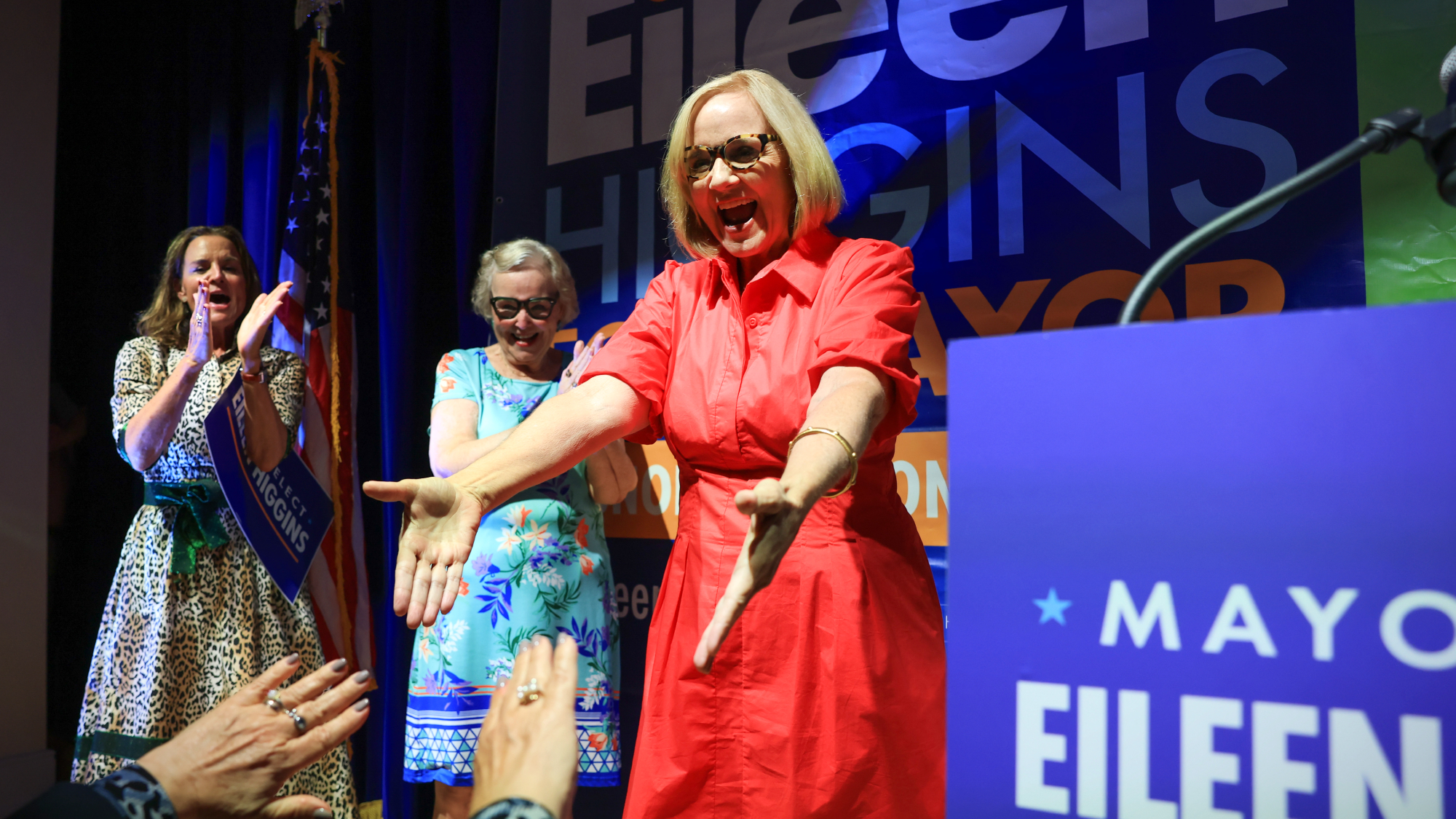Democrats face the gathering storm
Even if they can't stop the flood, it would be crazy not to prepare


A free daily email with the biggest news stories of the day – and the best features from TheWeek.com
You are now subscribed
Your newsletter sign-up was successful
Imagine you didn't know anything about Joe Biden, Donald Trump, the COVID-19 pandemic, critical race theory, Democrats' stalled spending bill, or any of the other personalities or issues that have dominated political commentary over the last several months. How would you expect a new president and his party to fare in the early years of his administration?
The answer is: pretty badly. Since the Civil War, midterm elections have tended to be a disaster for first-term presidents. Consider the fate of U.S. Grant. In 1870, Republicans lost 31 (of 243 total) seats in the House of Representatives to a party composed partly of literal secessionists. Closer to the present, the parties led by Presidents Reagan, Clinton, Obama, Trump, and to a lesser extent George H.W. Bush, all faced major setbacks in their first midterm contests. The only true exception within living memory is George W. Bush, who benefitted from a surge of support after 9/11.
The incumbent party's losses aren't necessarily confined to swing states or districts, either. There are almost always surprises. In 2010, the local politician and former male model Scott Brown managed to get elected to the Senate in deepest blue Massachusetts. Whether you look at overall outcomes, specific races, or opinion polls, the historical pattern is clear. Voters quickly turn against the presidents they just elected.
The Week
Escape your echo chamber. Get the facts behind the news, plus analysis from multiple perspectives.

Sign up for The Week's Free Newsletters
From our morning news briefing to a weekly Good News Newsletter, get the best of The Week delivered directly to your inbox.
From our morning news briefing to a weekly Good News Newsletter, get the best of The Week delivered directly to your inbox.
Considered in this light, the results from earlier this week weren't too surprising. Although there's a year to go until congressional elections, voters around the country are preparing to give Democrats a walloping. It's not just the headline contests in Virginia and New Jersey, where incumbent governor Phil Murphy barely survived a long-shot challenge. Republican candidates have done unexpectedly well even in cities such as Seattle and New York that rarely offer competitive two-party races.
Emphasizing such patterns can be deflating. Why bother participating, donating, or even voting if the outcome is predetermined? The perception of uncertainty generates enthusiasm. That's why trailing campaigns claim they're on the verge of victory until the last vote is cast, while leading ones sometimes pretend they're more worried than they really are.
Structural explanations also seem dismissive of voters' stated motives. Whether the issue is education, crime, or something else, people choose a candidate or party and actually turn out to vote for reasons that seem important to them. There's something condescending about arguments that conscious intentions are either irrelevant or merely derivative of deeper social currents.
But the mysterious relation between contingent events, idiosyncratic motives, and aggregate outcomes is at the core of social science. It's difficult and perhaps impossible to predict how any specific person will behave. But there are stable correlations between impersonal conditions and overall results. More than a century ago, that observation allowed the French sociologist Émile Durkeim to argue that while the decision to take one's own life may be unfathomable, we can predict how the suicide rate will respond to exogenous factors such as war or economic crisis.
A free daily email with the biggest news stories of the day – and the best features from TheWeek.com
Academics enjoy the detachment that "thermostatic" theories encourage. If political outcomes are mostly about self-correcting cycles, there's no reason to get worked up about particular issues or candidates. In any given election, the results may be unfavorable to one's own preferences. Over time, though, there's likely to be a correction toward the other side.
Political practitioners can't afford this Olympian distance. For one thing, patterns are not guarantees. Although their parties were crushed in the first midterms, Reagan, Clinton, and Obama all went on to be re-elected and left office with high approval ratings. But George H.W. Bush and Trump failed to win re-election, while George W. Bush suffered historic unpopularity in his second term. In the long run, we can probably count on the existence of two competitive parties that follow periodic losses with effective comebacks. But that's little consolation to candidates seeking office here and now.
The stakes aren't just electoral, moreover. Losing legislative majorities or executive offices means giving up the opportunity to implement preferred policies — and having to live with their competitors. From this perspective, emphasizing structural influences looks like an evasion of responsibility.
Democrats' predicament, then, might be compared to the situation of people confronting inclement weather. They know winds and rains are coming, but face choices about how to prepare. Should they leave the windows open and hope for a miracle? Or do the best they can to reinforce and waterproof their fragile house?
Even if you can't stop the flood, it would be crazy not to get ready. Although there's never a shortage of free advice in the wake of defeat, I'd encourage Democrats to concentrate in the following areas.
First, they need to accept that Biden's narrow victory in 2020 was a vote to "be normal and stop the chaos," as Rep. Abigail Spanberger (D-Va.) put it. Beyond the obvious fact that he was not Donald Trump, many voters saw Biden as a representative of stability, competence, and a more inclusive approach to politics. Although Biden has been less combative on social media, that's not what they've gotten. The chaotic Afghanistan withdrawal, continuing pandemic, and weak economy all encourage the conclusion that "Sleepy Joe" is out to lunch.
Some of these events are beyond the control of even the most competent president. Virus surges, renewed public health restrictions, supply-chain disruptions, and inflation are happening all over the world, not only in Joe Biden's America. One of the structural ironies of American politics is that presidents and their parties get credit for economic growth and blame for recessions even though they're not the major cause of either. Just ask George H.W. Bush, who had the bad luck to serve between booms credited to Reagan and Clinton, respectively.
All the more reason, though, to emphasize what can be controlled. At the border, where the president has broad discretionary authority, Biden has been erratic and ineffective. Even if the basic decision was right, the administration's performance in Afghanistan was similarly feckless. It needs to avoid another disaster in core areas of executive power.
The administration is not directly responsible for crime and education, where policy is set mostly at the local level. But it allows activists who hold seriously unpopular views about the meaning of race and gender "equity" to set the agenda. Although it had little if any practical significance, the Justice Department's favorable response to the NASB letter comparing critical race theory opponents to domestic terrorists symbolizes the problem.
If Democrats want to fight elections on the grounds that criticism in these areas is inherently racist, sexist, or otherwise deplorable, they're free to do so. It might be more effective to acknowledge that voters have legitimate concerns about the ideological capture of educational institutions and the tragic costs of violent crime. Contrary to progressive fantasies, these concerns are widely shared by minority voters rather than being the special property of fearful "Karens". That's why efforts to defund or fundamentally reorganize the police failed in Buffalo and Minneapolis.
In tactics, finally, last week's results undermine the once-fashionable theory that winning is just a matter of turning out the base. In Virginia, New Jersey, and elsewhere, Republicans successfully appealed to voters who supported Biden in 2020. Even if that phenomenon was, in part, a foreseeable a reversion to the pre-Trump mean, it's still a reminder that political coalitions aren't set in stone. You can't simply assume that groups that offered support in previous elections will do so in the future. They need reasons to stay loyal.
Last week's elections were a forecast of storms ahead. Will Democrats listen, or will they keep sailing toward disaster?
Samuel Goldman is a national correspondent at TheWeek.com. He is also an associate professor of political science at George Washington University, where he is executive director of the John L. Loeb, Jr. Institute for Religious Freedom and director of the Politics & Values Program. He received his Ph.D. from Harvard and was a postdoctoral fellow in Religion, Ethics, & Politics at Princeton University. His books include God's Country: Christian Zionism in America (University of Pennsylvania Press, 2018) and After Nationalism (University of Pennsylvania Press, 2021). In addition to academic research, Goldman's writing has appeared in The New York Times, The Wall Street Journal, and many other publications.
-
 5 cinematic cartoons about Bezos betting big on 'Melania'
5 cinematic cartoons about Bezos betting big on 'Melania'Cartoons Artists take on a girlboss, a fetching newspaper, and more
-
 The fall of the generals: China’s military purge
The fall of the generals: China’s military purgeIn the Spotlight Xi Jinping’s extraordinary removal of senior general proves that no-one is safe from anti-corruption drive that has investigated millions
-
 Why the Gorton and Denton by-election is a ‘Frankenstein’s monster’
Why the Gorton and Denton by-election is a ‘Frankenstein’s monster’Talking Point Reform and the Greens have the Labour seat in their sights, but the constituency’s complex demographics make messaging tricky
-
 Democrats win House race, flip Texas Senate seat
Democrats win House race, flip Texas Senate seatSpeed Read Christian Menefee won the special election for an open House seat in the Houston area
-
 Is Alex Pretti shooting a turning point for Trump?
Is Alex Pretti shooting a turning point for Trump?Today’s Big Question Death of nurse at the hands of Ice officers could be ‘crucial’ moment for America
-
 ‘Dark woke’: what it means and how it might help Democrats
‘Dark woke’: what it means and how it might help DemocratsThe Explainer Some Democrats are embracing crasser rhetoric, respectability be damned
-
 How realistic is the Democratic plan to retake the Senate this year?
How realistic is the Democratic plan to retake the Senate this year?TODAY’S BIG QUESTION Schumer is growing bullish on his party’s odds in November — is it typical partisan optimism, or something more?
-
 The billionaires’ wealth tax: a catastrophe for California?
The billionaires’ wealth tax: a catastrophe for California?Talking Point Peter Thiel and Larry Page preparing to change state residency
-
 Bari Weiss’ ‘60 Minutes’ scandal is about more than one report
Bari Weiss’ ‘60 Minutes’ scandal is about more than one reportIN THE SPOTLIGHT By blocking an approved segment on a controversial prison holding US deportees in El Salvador, the editor-in-chief of CBS News has become the main story
-
 Democrat files to impeach RFK Jr.
Democrat files to impeach RFK Jr.Speed Read Rep. Haley Stevens filed articles of impeachment against Health and Human Services Secretary Robert F. Kennedy Jr.
-
 Miami elects first Democratic mayor in 28 years
Miami elects first Democratic mayor in 28 yearsSpeed Read Eileen Higgins, Miami’s first woman mayor, focused on affordability and Trump’s immigration crackdown in her campaign
